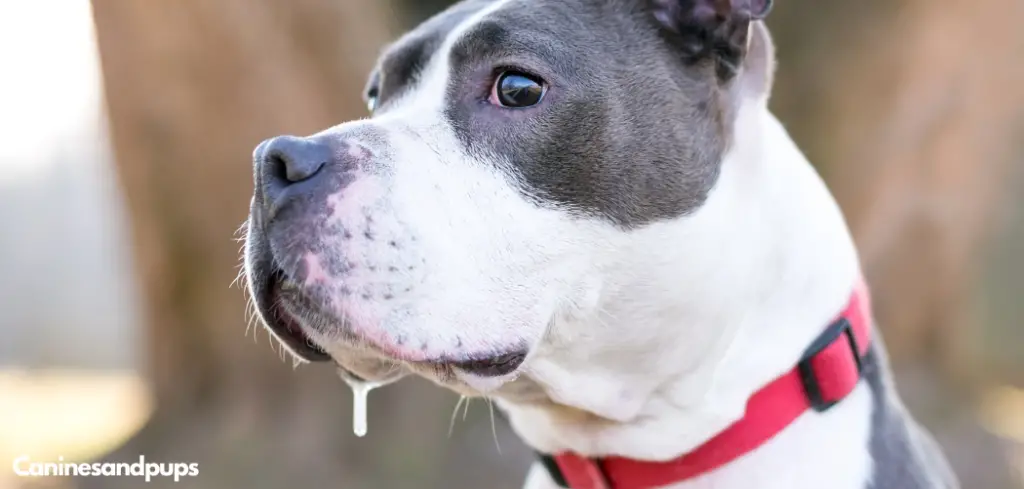When a dog is breathing heavy and salivating, it can be alarming for any pet owner. These symptoms can point to serious health concerns making it important not to overlook them.
We outline the possible causes of heavy breathing and salivation in dogs, what you can do at home, and when to seek veterinary help.
Dog Breathing Heavy and Salivating — Why It Happens
Heavy breathing combined with excessive drooling is usually a sign of underlying stress, illness, or overheating. Dogs may show these symptoms if they are experiencing heatstroke, heart problems, poisoning, or respiratory distress. Some gastrointestinal conditions and anxiety can also contribute.
While panting and drooling can be normal after exercise, when they appear suddenly, severely, or without obvious reason, they should raise concern.

Dog Breathing Heavily and Salivating: Common Causes
Heatstroke
Heatstroke is one of the most urgent causes of a dog breathing heavy and salivating. Dogs cannot sweat effectively and rely on panting to cool down.
In hot weather or after overexertion, their body temperature can rise dangerously. This leads to heavy, labored breathing, excessive drooling, and sometimes collapse.
Other signs may include bright red gums, weakness, or vomiting. Heatstroke is life-threatening and needs immediate action to cool the dog down while seeking emergency veterinary care.
Read more: Dog Breathing Heavy and Not Eating (Here’s why)
Heart Disease
Heart problems such as congestive heart failure can cause a dog to breathe heavily and salivate. A weakened heart struggles to pump blood effectively, leading to fluid buildup in the lungs and difficulty breathing.
Dogs may drool more because they are distressed or unable to swallow comfortably.
You may also notice coughing, fatigue, or a bloated abdomen. Heart disease requires ongoing veterinary management, and sudden worsening of symptoms is always an emergency.
Poisoning or Toxin Exposure
Dogs that have ingested a toxin may start breathing heavy and salivating as their body reacts.
Certain chemicals, plants, or human foods like xylitol and chocolate can cause drooling, tremors, and respiratory changes.
A poisoned dog may also vomit, become lethargic, or show neurological symptoms such as tremors and seizures. This situation demands immediate veterinary treatment since delays can be fatal.
Respiratory Problems
Conditions such as pneumonia, laryngeal paralysis, or airway obstruction can cause heavy breathing paired with drooling.
When a dog struggles to get enough air, they pant harder, and increased saliva production often follows.
Look for coughing, nasal discharge, or noisy breathing. These problems can worsen quickly, and dogs in respiratory distress should see a vet as soon as possible.
Gastrointestinal Upset
Stomach problems such as bloat, nausea, or severe abdominal pain can trigger both heavy breathing and excessive drooling.
Dogs drool when nauseous, and pain or pressure in the abdomen can lead to fast, shallow breathing.
Bloat in particular is a medical emergency. It causes the stomach to twist, cutting off blood supply and trapping gas.
Dogs with bloat often breathe heavily, drool, retch without bringing anything up, and show restlessness.
Anxiety or Stress
Not all cases are physical illness—sometimes, stress or fear can lead to heavy breathing and drooling. Dogs that are anxious may pant excessively and produce more saliva. This is common in situations like thunderstorms, fireworks, or car rides.
While less dangerous than medical causes, anxiety should still be taken seriously, as chronic stress impacts a dog’s overall health.
What to Do If Your Dog Is Breathing Heavy and Salivating
If your dog shows these symptoms, start by ensuring they are in a cool, calm environment. Move them out of the sun, provide fresh water, and keep them comfortable.
Monitor for other signs such as vomiting, collapse, coughing, or weakness.
If symptoms are mild and improve quickly, it may have been stress or exertion. However, persistent or severe signs mean something more serious could be happening.
Avoid giving home remedies or human medications unless directed by a veterinarian. Keeping your dog hydrated, calm, and closely watched until you seek professional guidance is the safest approach.
Always remember that dogs cannot tell us when they are in distress—breathing changes and drooling are often their way of signaling something is wrong.
When to Call or Visit Your Vet
Seek veterinary help immediately if your dog’s heavy breathing and salivation are sudden, severe, or accompanied by other concerning signs.
Red flags include:
Collapse or unresponsiveness.
Pale, blue, or bright red gums.
Persistent vomiting or retching.
A bloated abdomen.
Difficulty standing or moving.
Even if symptoms seem to settle, a vet visit is wise to rule out underlying conditions like heart disease or toxins. Prompt care can make the difference between recovery and life-threatening complications.
Read more: Dog Breathing Heavy and Throwing Up (What it could mean)
Key Takeaway
When a dog is breathing heavy and salivating, it should not be dismissed as normal panting.
While stress or temporary overheating can cause it, serious medical emergencies like heatstroke, poisoning, or heart failure are also possible.
The safest step is to monitor your dog closely, provide comfort, and seek veterinary guidance if symptoms do not resolve quickly. Early intervention can protect your dog’s health and give you peace of mind.
